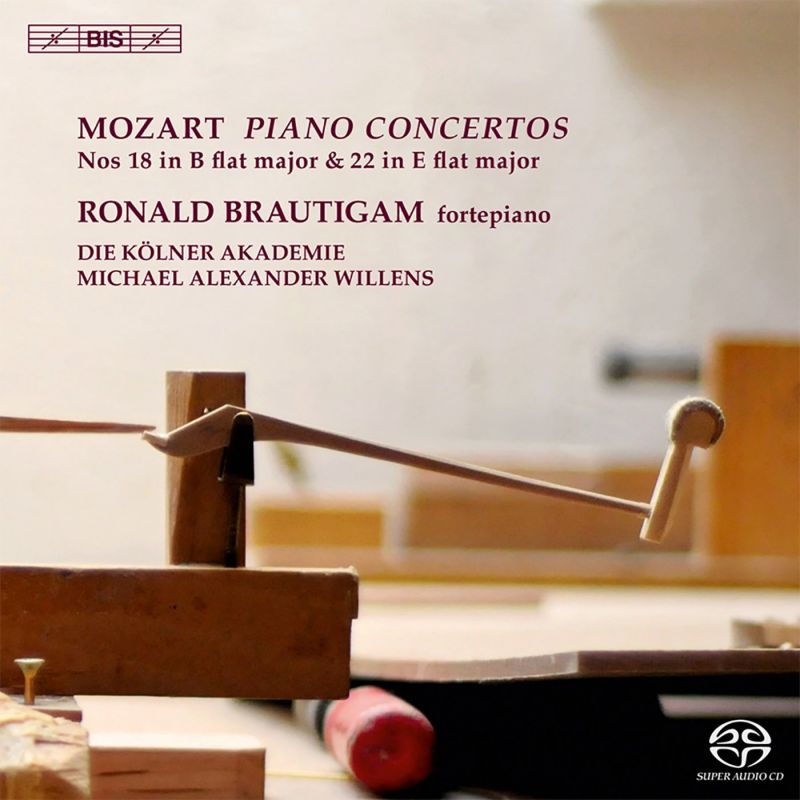MOZART Piano Concertos Nos 18 & 22
View record and artist detailsRecord and Artist Details
Composer or Director: Wolfgang Amadeus Mozart
Genre:
Orchestral
Label: BIS
Magazine Review Date: 07/2014
Media Format: Super Audio CD
Media Runtime: 60
Mastering:
DDD
Catalogue Number: BIS2044

Tracks:
| Composition | Artist Credit |
|---|---|
| Concerto for Piano and Orchestra No. 18 |
Wolfgang Amadeus Mozart, Composer
Cologne Academy Michael Alexander Willens, Conductor Ronald Brautigam, Piano Wolfgang Amadeus Mozart, Composer |
| Concerto for Piano and Orchestra No. 22 |
Wolfgang Amadeus Mozart, Composer
Cologne Academy Michael Alexander Willens, Conductor Ronald Brautigam, Piano Wolfgang Amadeus Mozart, Composer |
Author: Richard Wigmore
Likewise using a modern copy of an Anton Walter fortepiano, Brautigam favours rather fleeter tempi, and a more direct style of phrasing, than Robert Levin on his fine L’Oiseau Lyre recording with Christopher Hogwood (11/96 – nla). In the first movement, with its suggestion of a march for toy soldiers, Levin is more reflective, Brautigam more playfully extrovert, stressing continuity of line above rhythmic and tonal nuance. I prefer Brautigam’s more flowing manner in the G minor Andante, where Levin’s minute inflections can sound over-exquisite. The period woodwind, led by the virginal solo flute, are especially delectable in the serenading G major variation. As to the ‘hunting’ finale, you’d go far to hear a performance of such darting wit and panache, or one that exudes such a sense of delighted collusion between woodwind – each one an operatic character in itself – and the fortepiano’s sweet, silvery treble.
In the more opulently scored K482 (trumpets and drums, oboes replaced by clarinets) I ideally wanted a fuller string tone than the 14 Cologne players can muster. That said, the performance is scarcely less enjoyable than that of K456, not least in the C minor Andante, which at Brautigam’s unusually mobile tempo is just as touching, and (in the confrontational second variation) more dramatic, than in more gravely paced readings. Brautigam generates an exhilarating forward sweep in the regal opening movement – Levin (9/98 – nla) is more inclined to linger over detail – and an infectious sense of fun in the finale, where swiftness never compromises immaculate clarity of articulation. His own cadenzas are short and to the point. Levin’s are longer, cleverer and more consciously showy. Again, some may find Brautigam too swift in the finale’s sensuous Così fan tutte ish interlude, with its ravishing clarinet sonorities. For me the easily flowing pace and delicate touches of embellishment, predictably less lavish than Levin’s, mesh perfectly with the animated naturalness of the whole performance.
Discover the world's largest classical music catalogue with Presto Music.

Gramophone Digital Club
- Digital Edition
- Digital Archive
- Reviews Database
- Full website access
From £8.75 / month
Subscribe
Gramophone Full Club
- Print Edition
- Digital Edition
- Digital Archive
- Reviews Database
- Full website access
From £11.00 / month
Subscribe
If you are a library, university or other organisation that would be interested in an institutional subscription to Gramophone please click here for further information.




